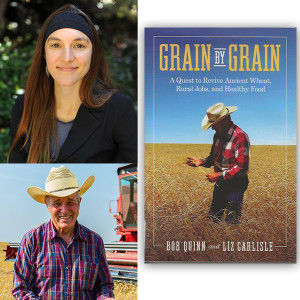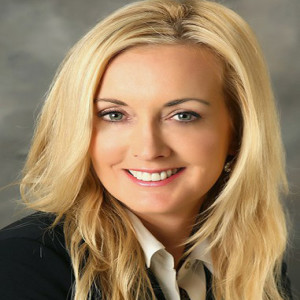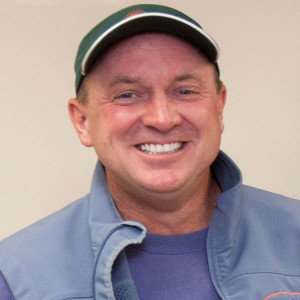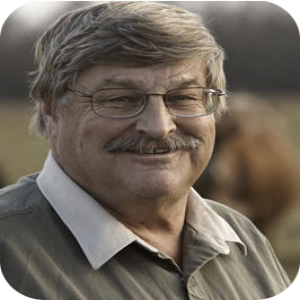Episodes

Friday Jul 26, 2019
Friday Jul 26, 2019
Hosted by Ben Trollinger / Editor, Acres U.S.A.
Hello and welcome to Tractor Time podcast, brought to you by Acres U.S.A., the Voice of Eco-Agriculture. I’m your host, Ben Trollinger, and as always, I want to say thank you to our sponsors, BCS America.
You’re probably heard of kamut (kah-moot), also known as khorasan wheat, also known as King Tut’s Wheat. It’s drought resistant and highly nutritious. It’s in organic breakfast cereals. It’s in pasta. People with gluten sensitivity can eat it. Artisan bakers drool over it.
It’s one of organic farming’s biggest success stories. It’s a story that’s rooted deep in history and it that might just show us the way forward.
I’m joined by Bob Quinn and Liz Carlisle, co-authors of Grain by Grain: A Quest to Revive Ancient Wheat, Rural Jobs, and Healthy Food.
The book details Quinn’s journey over the last several decades to turn his dryland farm in Big Sandy, Montana into a powerhouse of organic and regenerative agriculture. Through his multi-million dollar heirloom grain company, Kamut International, Quinn has managed to create a durable network of around 200 organic farmers.
Quinn was also instrumental in shaping the country’s first organic food standards back in the late 1990s. Before that, in the 1980s, he helped establish standards for his home state.
Liz Carlisle is a lecturer in the School of Earth, Energy, and Environmental Sciences at Stanford University. Her first book, Lentil Underground, prominently features Bob Quinn’s work and also won the Montana Book Award and the Green Prize for Sustainable Literature. She’s a forager of regenerative agriculture wisdom — and also a recovering country and western singer.
1 hour, 4 minutes

Tuesday Jun 25, 2019
Tuesday Jun 25, 2019
Hosted by Ryan Slabaugh & Ben Trollinger / Sponsored by BCS America
Good day and welcome to Tractor Time podcast, brought to you by Acres U.S.A., the Voice of Eco-Agriculture. I’m your host, Ryan Slabaugh, and as always, I want to say thank you to our sponsors, BCS America. Today’s theme is all about happy pigs, and profitable pig operations, and an interesting breed called Guinea Hogs.
First, I’ve got someone to introduce to everyone this episode. It will be the new host of Tractor Time, which I’m proud to say is Ben Trollinger, the new editor at Acres USA. I’m not going too far, but will stay involved helping Ben produce and grow the podcast, while I get to go focus on getting a few new exciting projects up and running.
Ben will join before he interviews Cathy Payne, our guest on this episode. Cathy is the author of Saving the Guinea Hogs, a new book that is on sale in the Acres U.S.A. bookstore.
First, I recently took a trip to Rodale Institute in Pennsylvania, and got a chance to tour their hog operation. To make sure this episode is all pig-themed, I thought I’d share some audio I got from touring their operation.
Thanks again to our listeners and our sponsor, BCS America. You can find this podcast at ecofarmingdaily.com, acresusa.com, or anywhere podcasts can be played. Thanks, and have a great week.
If you want, shoot a note to Ben at btrollinger@acresusa.com. He’d love to hear from you.

Monday May 20, 2019
Monday May 20, 2019
Hosted by Ryan Slabaugh
Sponsored by BCS America
Good day and welcome to Tractor Time podcast brought to you by Acres U.S.A., the Voice of Eco-Agriculture. I am your host, Ryan Slabaugh, and we are humbled to bring you the 30th episode. Today’s topic is one we have to talk about, but it’s not a whole lot of fun – Monsanto.
Our guest today, Carey Gillam, is a veteran reporter who has been covering corporate America for 25 years, including Monsanto and most recently, Bayer. This year, she’s been busy covering the Monsanto trials, suing agencies under the Freedom of Information Act, and discovering an amazing array of corruption that is fueling the more than 11,000 lawsuits against the company.
Mainly, she’s uncovered the fact that Monsanto has lied to and tricked farmers, land managers, growers, ranchers and city managers for 50 years about RoundUp. That as they tell their employees to behave differently around the product than they do consumers. And that they paid for fake science, paid off reporters, and got especially cozy with politicians around the world. France’s Parliament is exploring charges that they kept a list of politicians they liked and disliked. That’s nothing new to us here in the U.S., but that level of targeted lobbying does not go over so well elsewhere in the world. But the bottom line is, it’s toxic to human and animal health, and juries around the world that have heard their defenses do not see any redemption in them – in fact, it is quite the opposite. The lying has only added to their penalties, and their liabilities now range in the trillions, and Bayer’s stock price is 40% declined from where it was at the time they purchased Monsanto.’
Here’s a clip from the Canadian Public Broadcasting Channel’s recent coverage, which summarized the issue:
To be clear, we are talking about the specific formulation Monsanto uses in its RoundUp product that includes glyphosate – that’s an important distinction. Monsanto’s spokespersons deny all this and say there is no proof their product is unhealthy or shouldn’t be used. You can still find it everywhere, and even though towns and ciiteis are starting to make it illegal to use, it’s use is still prolific.
And who is fueling this worldwide coverage? Our guest today, Carey Gillam. She wrote a book called Whitewash: The Story of a Weed Killer, Cancer & the Corruption of Science, published by Island Press, in 2017. The way she threads her reporting in with current events paints a damning picture of Roundup, even garnering praise from Erin Brockovich.
And our guest today makes the strong point that banning RoundUp or glyphosate, or suing for billions, does not solve the real problem we are facing: an agriculture and food supply dependent on the lies that Monsanto has been giving farmers, and the safety nets are a bit too far down to feel comfortable leaping.
It’s our listeners who will really be solving this problem, but taking the information Carey gives us today to educate us on the forces at work in the herbicide world, and how we can make informed, healthy choices. You can make a difference by how you grow food, the food you buy at the store, and by the manner in which we defend eco-agriculture.
So, let’s get into the interview with our guest today: As a former senior correspondent for Reuters' international news service, and current research director for consumer group U.S. Right to Know, Carey Gillam's areas of expertise include biotech crop technology, agrichemicals and pesticide product development, and the environmental impacts of American food production. Gillam has been recognized as one of the top journalists in the country covering these issues.
A special thanks to our episode sponsor, BCS America.

Tuesday Apr 23, 2019
Tuesday Apr 23, 2019
Hosted by Ryan Slabaugh
Good day and welcome to Tractor Time podcast brought to you by Acres U.S.A., the Voice of Eco-Agriculture. I’m your host Ryan Slabaugh, and today our episode is focused on soil health, and the philosophies of Glen Rabenberg. Glen has spent a lifetime journey building a system that works across climates and soil types, and in the next hour, we’re going to ask him to walk through his journey, and how he piece together the knowledge – and wisdom – he needed to eventually start his company, Soil Works, which helps so many farmers around the world.
As you will also hear, Glen will be leading a farm tour at our Healthy Soil Summit, August 21-22 in Davis, California. Registration is open at www.acresusa.com, and we are only allowing about 150-200 into the event, so sign up soon. Glen is also working with us to produce a series of podcasts we will release this summer focused on short, simple tactics you can employ on your farm to increase and improve your soil life.
One other announcement: We will also be opening registration to our annual conference, this year in Minneapolis, Minnesota, December 9-12, in May. We have a ton of great speakers — some new, including Marty Travis, the start farmer in the movie, Sustainable. We really want to see you there – we’ll be talking about biodiversity, regenerative agriculture and diversification tactics and a whole lot more. But today’s program is soil-soil-soil with Glen Rabenberg, and his life journey.
Our guest today, Glen Rabenberg is the founder and owner of Soil Works LLC. Born and raised in Bancroft, SD, he graduated from Desmet High School in 1980. He was awarded a Bachelor of Science in Animal Science, General Agriculture and Agriculture Economics from South Dakota State University in 1985. Glen then went to work for Walco International as an Animal Science Technical Advisor. He spent most of the following years with Walco working with animal pharmaceuticals, veterinarians, and farmers. Through his experience he began to notice trends in the animal science industry. He saw that many of the diseases he was employed to treat were the result of nutritional deficiencies from poor grains and forage that the animals were consuming.
Rather than conforming to the traditional methods of soil science, Glen brings his knowledge of animal science and applies it to the soil. Glen continues to search for new ways to restore the soil and aid in the production of quality food. He aims to “bring soil back to the way nature intended.” He still maintains his third generation farm in Bancroft, SD and travels the world solving the world’s soil problems with a little bit of simplicity and the “rite” tools.

Thursday Apr 11, 2019
Thursday Apr 11, 2019
Good day, and welcome to Tractor Time podcast brought to you by Acres U.S.A., the voice of eco-agriculture. This is a special episode, our 28th in our series, that will feature a friend and guest to Acres U.S.A., Dr. Paul Dettloff. A special thanks to our series sponsors, BCS America and Albert Lea Seed, who make this all possible.
Dr. Paul Dettloff has spent 50 years in large animal veterinary practice, working with farmers all over the world to help them think differently. He was well ahead of his time pushing grass as cattle feed, and working with holistic, proven tools that operate completely independent of the technology booms happening today.
His new hardcover book, A Guide to Raising Animals Organically, has captured his work in a fascinating, comprehensive way. We were very proud to be Dr. Paul’s publisher of the book, which is available now.
We are also very proud that Dr. Paul will be talking at our conference in December in Minneapolis. He will be leading a full day Eco-Ag conference session on soil preparation for cattle, cattle feed systems and will allow folks to peek inside his vet bag. He'll add on a workshop too about A2A2 milk markets that should be very helpful for today's dairy farmer looking for diversification techniques.
The last time he talked was 2007, and we wanted to share that talk with our audience today. It’s a fascinating story Dr. Paul weaves around his career as a veterinarian, and how he discovered organic along the way, and helped champion the growth and rebirth of old veterinary tools so important to sustainable and organic farmers.
So, here’s Dr. Paul’s talk from 2007, titled “Enhancing Vet Tools.” It’s more than just a story about livestock. It’s a story about how we treat animals, and how those animals can feed our farming ecosystems.

The Voice of Eco-Agriculture
Founded in 1971, we strive to be lifelong educational partners for farmers, ranchers and growers of all kinds. We strongly believe to farm economically, you must farm ecologically.
Learn more at www.AcresUSA.com




